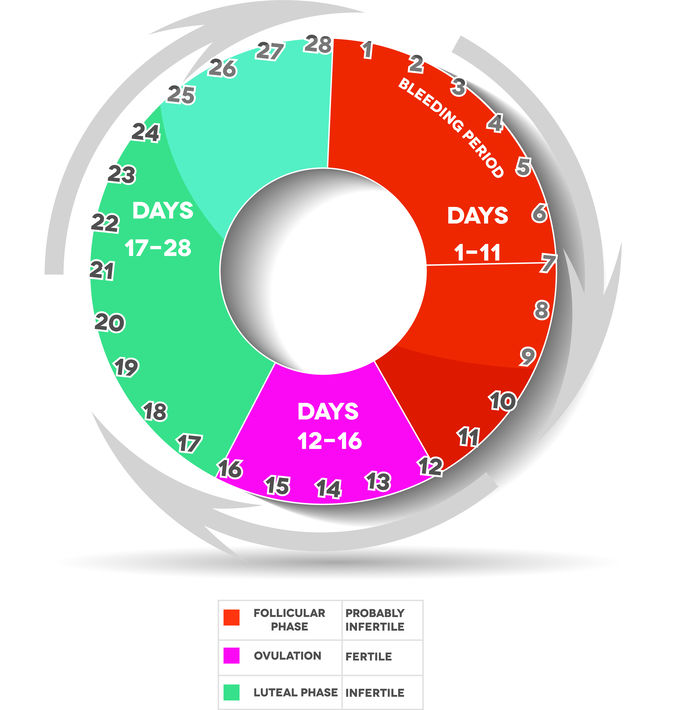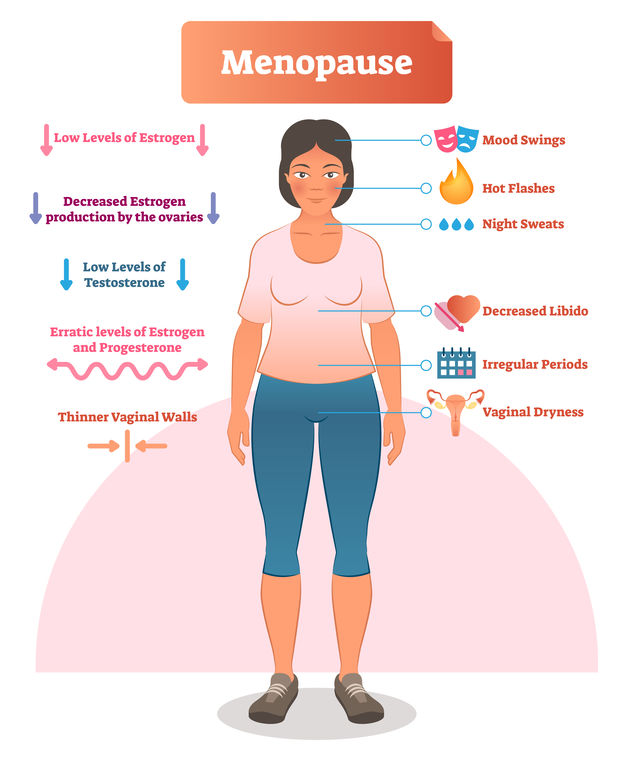You may loathe that time of the month when Aunt Flo comes to visit, and yet be quite put out when it doesn’t seem to arrive. Before rushing out to buy a pregnancy test, remember that a late period, or even a missed period, does not necessarily mean you’re pregnant. There could be a few reasons for this.
Your period actually says a lot about the state of your health, so fortunately for us women, we have this outward indicator of something not being quite right inside our bodies. When your hormones are out of whack, it can have an impact on your period – sometimes your period may just be later than usual, sometimes you may have a missed period altogether. A late period could be the result of anything from working out too much or not getting enough sleep that month. As your period is indicative of your overall health, a late period or missed period can draw your attention to health problems and something else going on in your body.
Menstrual Cycle 101

Every month, the female body prepares for pregnancy. It involves an egg being released from the ovaries and the thickening of the wall of the uterus in preparation for an embryo. If pregnancy does not occur, this lining will shed and that is the bleeding you experience during your period. This cycle is controlled by different hormones produced in both the brain and the ovaries which work together. There are 4 main stages of the menstrual cycle, and these hormones rise and fall during these stages.
Menstrual Phase (approximately 3-7 days) – This is the first stage and starts with your period. As no pregnancy has occurred, the thickened lining of the uterus will be shed. During this phase, levels of the two main hormones regulating your cycle, estrogen and progesterone, will drop.
Follicular Phase (approximately 16 days) – This overlaps with the menstrual phase as it also starts on the first day of your period. During menstruation, your body is preparing to ovulate again. An area of the brain called the hypothalamus sends a signal to the pituitary gland to release a hormone called FSH (follicle stimulating hormone) which results in follicles being produced on the ovaries. One of these follicles will mature and produce an egg which causes a surge in the hormone estrogen necessary for the uterus to prepare for pregnancy.
Ovulation Phase (approximately 24 hours) – Ovulation usually occurs around day 14 of your cycle. It is the only time during your menstrual cycle when you can fall pregnant. During this phase, the increased levels of estrogen stimulate the pituitary gland to secrete LH (luteinizing hormone) and an egg is released from the ovary to be fertilized by sperm. If fertilization doesn’t take place, the egg will disintegrate.
Luteal Phase (approximately 14 days) – During this phase, levels of progesterone will increase as the follicle which released the egg changes into the corpus luteum. If you fall pregnant, this corpus luteum will continue to produce progesterone to keep the uterus lining thick to support a developing embryo. If fertilization did not occur, the corpus luteum will dissolve, resulting in progesterone levels dropping and the lining of the uterus to start shedding.
You’ve probably heard that a ‘normal’ menstrual cycle is typically 28 days and every 28 days you should get your period, but the truth is that what’s normal could be anywhere from 21 to 35 days. This makes tracking your period so important so that you can know what is normal for you and allow you to see if something more could be going on which could be indicative of your overall health. If you miss 3 periods in a row, you have what is considered amenorrhea which usually indicates a hormonal imbalance or a problem with the reproductive organs.
Why Is My Period Late?
As seen above, the female reproductive system is complex with lots of different interactions between the brain, hormones and ovaries, so if one area isn’t working as it should, it can prevent or delay ovulation and if you don’t ovulate, you won’t get your period. Here are some conditions that can play a role in your menstrual cycle operating as it should.
Stress
Stress can have serious consequences on how the brain functions and also how the body responds to these changes in the brain. And as the brain plays a role in regulating the hormones that regulate your period, the connection between stress and your periods is obvious. When we are stressed, our body is in a constant state of ‘fight or flight’. This ‘fight or flight’ response is the body’s reaction to a threatening situation – the hypothalamus responds to the threat and sends signals to the rest of the body to react. It is only supposed to be a temporary response to get you to react to the immediate danger. But when we are stressed, the hypothalamus is constantly being fired up. As this area of your brain plays a vital role in regulating the hormones necessary for your menstrual cycle to function properly, it won’t be able to do its job properly when it is constantly being activated to react to stress. Another way that stress affects your period is because it may result in weight changes – both weight gain or weight loss – and your weight is also a key factor in the regularity of your periods.
Weight Loss Or Low Body Weight
Being underweight or suddenly losing a significant amount of weight can alter hormone levels which can halt ovulation, resulting in a late period or missed period. If you have lost a lot of weight, it is worth checking in with a dietician to make sure you are getting all the vitamins and minerals your body needs. If you have a low BMI and are below normal weight, it may put stress on your body to function properly. This stress can result in hormonal changes, particularly low estrogen levels. Low estrogen levels will not only stop ovulation, it is also bad for bone health.
Obesity Or Weight Gain
Just as being underweight affects ovulation, the same goes for being overweight. The main reason, again, is hormones, particularly estrogen. Your ovaries are responsible for producing estrogen, but fatty tissue also plays a role in the manufacturing of estrogen. If sufficient estrogen is produced by the fatty tissue, then it can disrupt the regular processes of your menstrual cycle leading to late periods or missed periods. When your period does arrive, it may be heavy and painful as the high estrogen levels cause the lining of the uterus to thicken.
Excessive Exercise
Exercise provides many health benefits, so you probably expect it to have an effect on your menstrual cycle. This is because of the influence exercise can have on your hormone levels. Some of these effects include lighter flow, missed periods, or spotting instead of period. Despite exercise being positive and having many health benefits, it still puts your body under some stress, the same as with significant weight loss. This stress affects the hypothalamus in the brain and interrupts the communication between the brain and the hormonal messages it sends to the ovaries and uterus. The extent to which your period is affected by exercise is not the same for everyone and varies depending on how your body copes with these changes.
Thyroid problems
Your thyroid is a tiny butterfly-shaped organ located in the neck but it plays a major role in many bodily functions such as your metabolism and heart rate. It creates specific hormones which control the different processes in the body, and when these hormones aren’t being produced as they should, your menstrual cycle is affected. One in eight women is diagnosed with some kind of thyroid disorder in her lifetime which makes this a common cause of a late period or missed period and one thing your doctor will check for if your periods are delayed.
PCOS
PCOS, also known as polycystic ovary syndrome, is a condition where cysts develop on the ovaries due to a hormonal imbalance. This hormonal imbalance is a high level of the hormone androgen which is a male hormone. This results in either irregular ovulation or not ovulating at all, and if there is no ovulation, you won’t get your period. Around 10% of women who are of childbearing age have PCOS. Some signs include:
- Late or missed periods
- Irregular bleeding patterns
- Acne and other skin conditions
- Weight gain
- Sleep apnea
- Infertility
- Excess hair on the face and other areas of the body
- Thinning hair
Breastfeeding
When you are breastfeeding, your body is producing an increased amount of the hormone prolactin. This can stop your periods or cause irregular cycles and late periods. You can also have high prolactin levels even if you are not breastfeeding. One sign of this is a milky discharge from the nipples.
Early Menopause

Women typically start menopause in their late 40s to early 50s. When you don’t have a period for 12 months you are said to have reached menopause. The period of time before your cycle stops completely, called perimenopause, is when most women start experiencing menopause symptoms including period irregularity as your egg supply starts to diminish. Sometimes women may experience this earlier than usual, at around age 40 or even younger.
Late Periods – What Can You Do?
If you don’t suspect pregnancy, there are a few things you can do to keep your periods more regular:
- Maintain a healthy weight by eating a diet consisting of whole foods while avoiding processed foods.
- Find ways to de-stress and relax. A calming supplement could be worth taking to combat chronic stress.
- Have a physical examination to rule out any serious health concerns such as thyroid problems.

